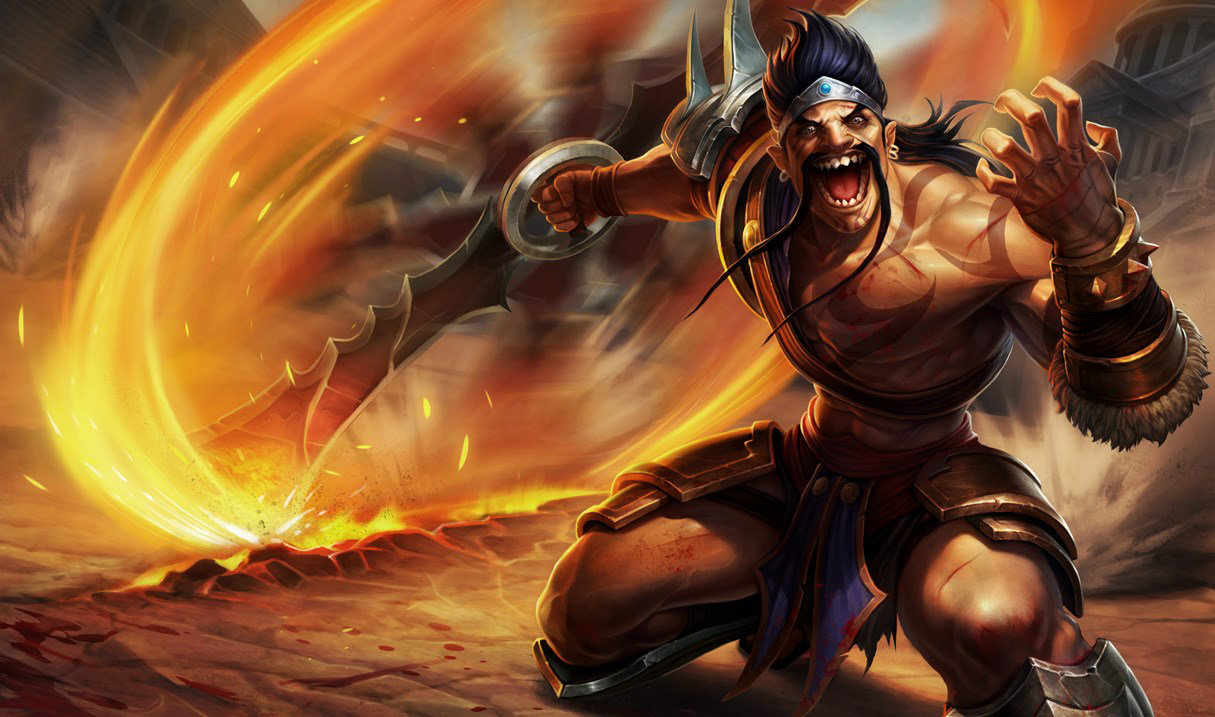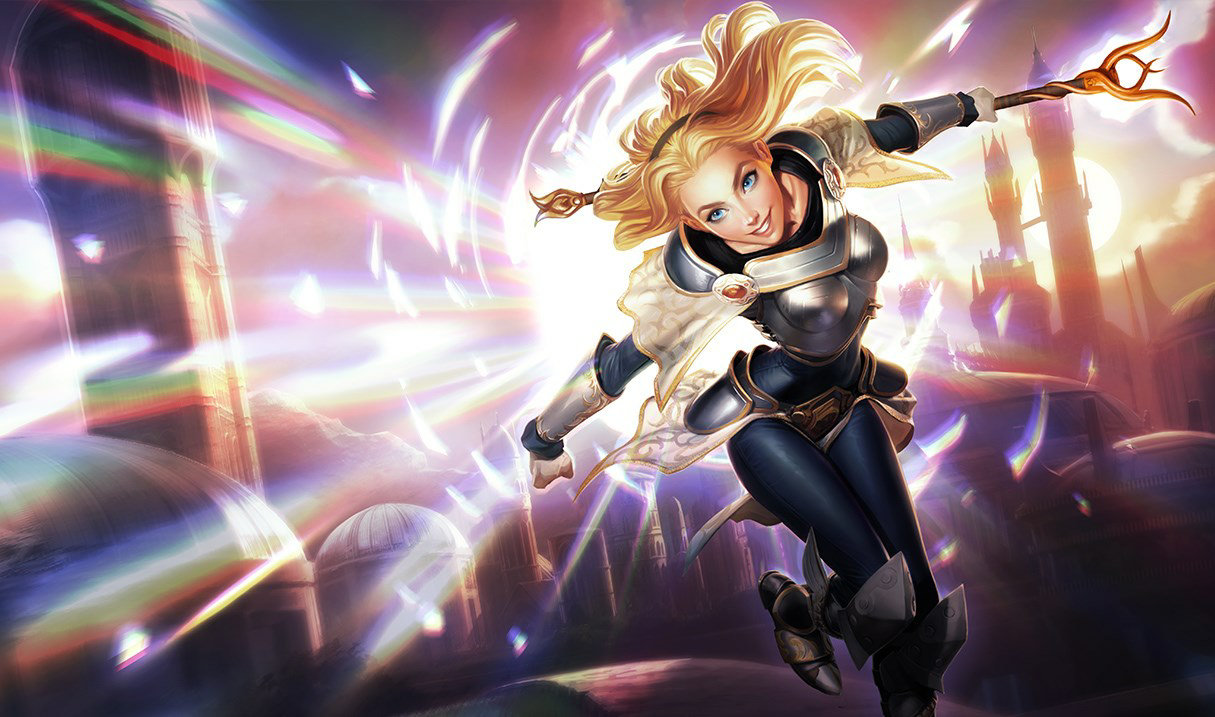Riot's 7 new games are a declaration of war against Blizzard
As Blizzard continues to falter, Riot is out for blood.

For the past decade Riot Games has been a company trapped in a bubble. Despite having millions of players worldwide, if you don't actively play League of Legends you probably don't care all that much about Riot. But over the course of a single hour last night during its tenth anniversary livestream, Riot announced eight new projects including a long-rumored League of Legends fighting game, a management sim, a tactical multiplayer FPS, a card game, and mobile versions for both League of Legends and Teamfight Tactics. Some of these games are years away, but Riot's big birthday party felt like the opening beach assault against its biggest competitor: Blizzard.
The past year has seen an unprecedented erosion of the goodwill and trust that players had in what was once PC gaming's most iconic developer.
In the last 12 months, Blizzard has bounced ungracefully from one controversy to another. It started at Blizzcon 2018, when the developer known for its close-knit community massively misjudged the expectations of its audience by capping a lukewarm show with the announcement of a Diablo mobile game—an unpleasant surprise to fans who had been hoping Blizzard had some big secret reveal (even though Blizzard said weeks earlier that wasn't the case). At the time, players were already pissed off with World of Warcraft's latest expansion because it felt like a step back over the previous one. But the issue was exacerbated by sarcastic comments from developers like "don't you guys have phones?" and reports that some of Blizzard's top talent were working on mobile games.
A month later, Blizzard unceremoniously killed an entire esports scene when it cancelled plans for Heroes of the Storm's Global Championship season. Overnight, an entire community of casters and pro players were out of the job and forced to migrate to other games. Two months after that, Activision Blizzard CEO Bobby Kotick boasted of "record results in 2018" while simultaneously announcing that Blizzard was laying off 800 people.
Things were mercifully silent through the summer of 2019, with World of Warcraft Classic's enormously popular launch being the high point. But then, just weeks before Blizzcon 2019, Blizzard created an international incident by banning and revoking the winnings of a pro Hearthstone player who called for Hong Kong's liberation from China during a post-match interview. Instead of facing the ensuing backlash directly, Blizzard then released a tepid response on a Friday evening, quietly reducing the punishment for the player and the two Taiwanese casters present during the interview but doing little to assuage concerns over what motivated the decision in the first place.
The past year has seen an unprecedented erosion of the goodwill and trust that players had in what was once PC gaming's most iconic developer. Blizzard founders are retiring, Activision's marketing and cost-sensitive influence is reportedly growing, and now people fear that Blizzard is increasingly beholden to the whims of the Chinese government and the gaming market that government authoritatively controls. To say it's been a disastrous year for Blizzard is putting it mildly, and Riot is clearly looking to capitalize.
Target acquired

On October 15, Riot revealed a eight new projects including a fighting game, tactical FPS, card game, and even an animated TV series based on League of Legends. It's a lot to keep track of, so here's a handy breakdown of everything you might've missed.
Next year the League of Legends card game, Legends of Runeterra, will release and directly compete with Hearthstone. And Riot is also working on a competitive multiplayer FPS that sounds an awful lot like Counter-Strike meets Overwatch and an action RPG which may take after Diablo. But these games are more than mere competition—they feel like direct responses to the major criticisms people have leveled at Blizzard games and their associated genres.
The Legends of Runeterra announcement, for example, focused partly on the expensive microtransactions that make card games like Hearthstone so frustrating to play. Instead of gambling on randomized booster packs to fill out your collection, Legends of Runeterra will have a system where you can buy cards directly for either premium or in-game currency earned through playing. Likewise, a large portion of their tactical FPS announcement focused on how Riot would be tackling long-standing FPS issues like server tickrate, peeker's advantage, and cheating.
Keep up to date with the most important stories and the best deals, as picked by the PC Gamer team.
The way that Riot is building an expanded universe based on League of Legends is straight out of Blizzard's playbook. Though Heroes of the Storm was the first to actually mix Blizzard characters and settings, crossover events and in-game cosmetics make Blizzard games feel like one ecosystem. Warcraft, Starcraft, Diablo, and Overwatch have always felt like different faces of the same die—games inextricably linked by "Blizzard polish" and unifying values that makes events like Blizzcon possible.
There's a heritage there that Riot cannot compete with, but it does have some major advantages: All of its games (aside from the upcoming FPS) share the same characters and universe. With League of Legends boasting 8 million peak concurrent players worldwide, there's enormous potential in finding new ways to explore those 140 champions that players already feel so invested in. At the very least you can expect loads of cross-promotional events and cosmetics.
If you're not a League of Legends player, that idea might seem laughable. Who cares about the backstory of some MOBA character? But if you pay attention to dedicated fans, you'll notice an acute awareness of these narratives—the fictional rivalries and odd bits of trivia that flavor these champions—that Riot has steadily expanded into a sweeping universe of short fiction found on its own website dedicated to LoL's mythology.
Like Blizzard, Riot has a panache for vibrant worldbuilding and colorful characters, and its Arcane TV series is a chance to leverage that into something more evocative than bits of lore trivia drip-fed through loading screens. Riot clearly wants to be the Marvel of games and, unlike Blizzard, can reap the benefits of having a singular world and character roster that unifies all of its projects.
Half of the announcements Riot made last night were for mobile games and no one seemed to care.
The other advantage Riot has is that it's often just as guilty of the same supposed sins that have vilified Blizzard but rarely ever incriminated. While Blizzard is burning at the stake for protecting its business interests in China, Riot has been 100 percent owned by the largest Chinese tech corporation, Tencent, for years without sparking any kind of concerted outrage. In the immediate aftermath of Blizzard's Hong Kong controversy, Riot also warned pro players not to mention politics—but that didn't result in being called out on Twitter by US lawmakers.
It's even funny to consider that, despite being a PC-only developer until now, half of the announcements Riot made last night were for mobile games and no one seemed to care. During the announcement of Teamfight Tactics' mobile version, product manager Jessica Nam even quipped, "it turns out that you guys actually do have phones." She mocked Blizzard for announcing a mobile game while announcing a mobile game .
Blizzard's fans already feel misunderstood and disenfranchised, so when it protects its business in China or chases mobile gaming trends, it validates the feeling that something about Blizzard is changing—and not for the better.
But even in the aftermath of ugly controversies like reports of institutional sexism, it's moments like Riot's livestream that indicate Riot's relationship with its players is still in good shape and that people are optimistic about the next ten years of League of Legends. Riot has found a way to make money in multiple markets and not make any particular one feel less important than the other (for now, at least). That's a luxury that Blizzard just doesn't have and, with people looking to protest Blizzcon next month, probably won't have any time soon—if ever again.
Though it could be years before Riot's Blizzard-killers are actually released—not to mention whether they're even good—it's clear that the fellow California-based studio is no longer content with quietly operating the world's most popular game anymore. Riot feels like it's evolving into something much bigger, and as Blizzard's spot as PC gaming's most-beloved developer begins to slip, I smell a usurper.
With over 7 years of experience with in-depth feature reporting, Steven's mission is to chronicle the fascinating ways that games intersect our lives. Whether it's colossal in-game wars in an MMO, or long-haul truckers who turn to games to protect them from the loneliness of the open road, Steven tries to unearth PC gaming's greatest untold stories. His love of PC gaming started extremely early. Without money to spend, he spent an entire day watching the progress bar on a 25mb download of the Heroes of Might and Magic 2 demo that he then played for at least a hundred hours. It was a good demo.


